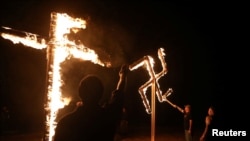White House and Pentagon officials are defending decisions to conduct in-depth reviews of the dangers posed by domestic extremists in the United States, pushing back against criticism that the measures will result in a so-called political litmus test.
Nascent anger over the new efforts to look at domestic extremism in the wake of the Jan. 6 siege of the U.S. Capitol building has been growing in recent days, touched off by a decision by Defense Secretary Lloyd Austin to order a military-wide stand-down to determine the scope of the problem.
The Biden administration rejected the objections Friday, insisting that no one is trying to encroach on the constitutional right to free speech.
“We are not going after people based on their political allegiances or their political beliefs or their speech or their constitutionally protected political activities,” a senior administration official told reporters late Friday on the condition of anonymity given the sensitivity of the subject. “We are going after violence."
A Defense Department spokesperson was equally quick to dismiss the claims.
“The argument that this amounts to some sort of political litmus test, that is absolutely unfounded and untrue,” Pentagon press secretary John Kirby said during a briefing Friday.
“We encourage our troops to vote. We encourage them to register with the political party of their choice,” Kirby added. “But whatever the motivation is, when you violate good order and discipline. when you violate the UCMJ [Uniform Code of Military Justice], when you violate civil laws, then we’ve got a problem.”
Some of the most pointed and public criticism has come from newly elected Rep. Lauren Boebert, a Republican lawmaker from Colorado, who tweeted Thursday that the Defense Department stand-down is “nothing but a political litmus test of our brave men & women.”
“It is obscene & dangerous to use soldiers who risk their lives for America as political pawns,” she added.
Defense Secretary Austin ordered a standdown – a pause in military operations – on Wednesday to give the leaders of the military services a chance to talk about the spread of extremist ideology and the impact it is having on military members.
In a memo issued late Friday, the Defense Department said each military service would hold a standdown at some point over the next 60 days, though extensions can be granted "if required by the operational nature of the unit.”
"Leaders have the discretion to tailor discussions with their personnel as appropriate, but such discussions should include the importance of our oath of office; a description of impermissible behaviors; and procedures for reporting suspected, or actual, extremist behaviors,” Defense Secretary Austin wrote, calling the stand down just the start of "must be a concerted effort.
“[This] sadly is not an issue that we haven't dealt with or tried to deal with in the past,” Kirby said Friday about the Pentagon’s need to confront extremist ideology. “You heard the secretary himself talk about when he was in command of the 82nd Airborne down in Fort Bragg, an issue they had with [neo-Nazi] skinheads in the unit and that was when he was a lieutenant colonel back in the mid-90s.”
“The events of January 6 certainly galvanized the sense that it is still in the ranks, still a problem,” he added.
Of the 181 individuals charged in the siege of the U.S. Capitol, 20 have some sort of military background, according to a tally by George Washington University’s Program on Extremism.
Additionally, of the 143 investigations opened by the FBI into current and former military members last year, 68 were because of concerns about domestic extremism, according to the Defense officials.
In an interview Friday, the U.S. Navy’s top admiral warned that domestic extremists are also actively targeting former military members.
“We have a responsibility to educate those that are leaving the service that they are going to be recruited by these people, and they need to be aware that they’re going to have people reach out via email or social media,” Chief of Naval Operations Adm. Mike Gilday told Breaking Defense.
White House officials have described their effort to get a better sense of the threat posed by domestic extremism as even broader, pointing to data that shows the FBI is conducting an average of about 1,000 domestic terrorism investigations each year.
“Our work on this is just beginning,” the senior administration official said, expressing hope the initial review on the size and scope of the country’s domestic extremism problem will be completed in the next three months.
“We're going to be painstaking and really building out the picture of this threat, effectively getting the kind of expertise at the table that's necessary to confront it,” he said.
“Depending on what we find in this review, we will have to confront the question of whether, in fact, additional personnel, additional dollars would need to flow to federal law enforcement,” the official added.
Complicating matters, according to experts and counterterrorism officials, is that social media has allowed U.S. extremists to communicate with like-minded people around the world.
“It's an area of acute interest,” the senior White House official said, noting “the potential for linkages to foreign networks, foreign organizations, foreign funding and so forth.”
So far, the U.S. has only designated one white supremacist group as a global terrorist organization –- blacklisting the Russian Imperial Movement (RIM) last April.
The listing has helped the U.S. to keep RIM members from entering the country and to deny them other resources.
In remarks last month, then State Department counterterrorism coordinator, Ambassador Nathan Sales, told a virtual forum the designation of RIM "shouldn't be the last" for a foreign white supremacist group.
“"We need to continue to identify potential targets," he said.





